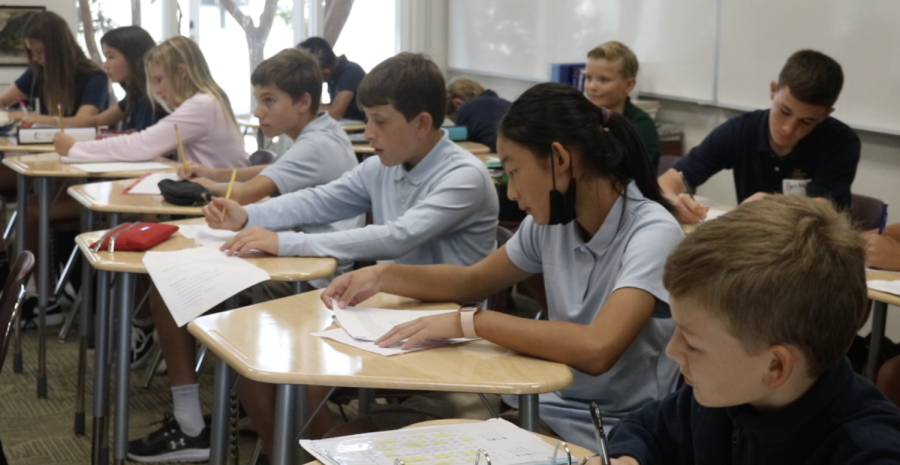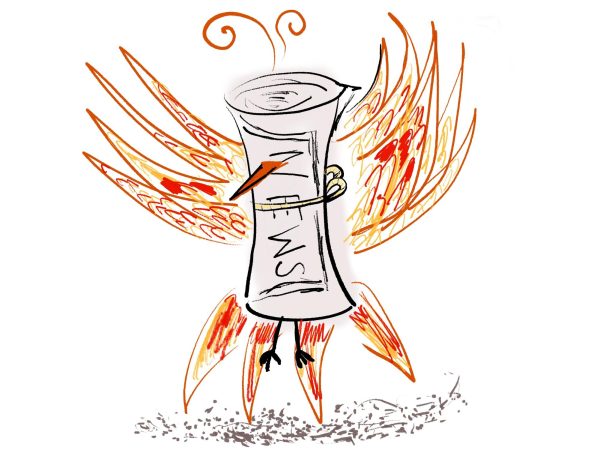Grades Are Out
Why obsessing over grades undermines long-term knowledge retention
Students can learn in many ways, such as through discussion, taking notes, and preparing for tests. However, the methods used to learn can vary from teacher-to-teacher, and class-to-class.
There is an old saying attributed to the author Mark Twain that goes: “Don’t let school get in the way of your education.” In Bishops’ ongoing state of GPA panic, college fever, and grade obsession, I am afraid Mr. Twain would be deeply saddened by the common disregard of his aphorism.
However, grades aren’t just on the minds of Bishopians. Nationally, grades are rising. According to a study conducted by The Hechinger Report, the average high school GPA was 3.39 in 2021, much higher than the 3.0 GPA recorded ten years prior. The growing competitiveness in college admissions may in part contribute to the rise in grades.
Even just from 2020 to 2021, applicants for high-tier, well-known schools like the University of California, Los Angeles (UCLA), and Penn State saw double-digit surges in applications. Additionally, Harvard University held the record last year with a 42% increase in applications. This is a national trend — college admissions are becoming more competitive, and thus, the drive for high grades is increasing.
So, grades are rising, but is this a good thing? Of course, it seems so – why wouldn’t an increase in grades nationally be beneficial? On the contrary, however, the negative effects are rooted in the nature of grades themselves. Grades are designed to, well, grade us. They are meant to convey how well we understand the content we are learning. However, with higher grade expectations comes a new problem: the retention of knowledge.
Spanish Teacher Mr. Gregg Luna explained that students have trouble retaining knowledge because they are under extreme stress because of their grades. He explained, “The nature of the beast of this school often puts the kids in a position where they are so pressured and stressed.” This growing pressure and stress surrounding grade obsession that Mr. Luna references may in part be a contributing factor to poor-long term retention of knowledge.
At Bishop’s, many students feel this way. Sashi Chuckravanen (‘25) explained, “The night before a test I stress and cram all the information into my brain, and after the test, the stress makes me forget it all.” This highlights that students often do not fully understand what they learn, but rather do what they must for the grade. Because the point of education is to learn and retain knowledge for long periods of time, the current attitude towards grades – one of cramming for tests the day before to get a decent score – is not compatible with education.
Mia Gaspar (‘24) agreed with this, and expressed, “We do not study to learn, but study to get a good grade.” Ellen Wang (‘25) added, “I only remember [the material] while I am studying and taking the test, a week later, I forget it all.”
Because students are failing to actually retain knowledge due to the stressful environment of tests, fueled by the exorbitant grade obsession, the current norm in education must change – but how?
The answer may lie in the Finnish way of teaching. Finland has mastered education, following a centralized curriculum but letting teachers personalize it to their students’ needs. They move at a slower pace, using more creative types of grading rooted in rewarding curiosity and participation highest, to ensure the long-term retention of the information. And it works too. According to The Guardian, Finland is the most literate country in the world, at 99%, much higher than the United States’ 79% literacy rate according to the National Center for Educational Statistics.
Mr. Luna follows this method of teaching. He explained, “My grading is based on performance, participation and creativity. Trying to have them speak and learn communicatively.” He does this because, as he says, “An ‘A’ student is not someone who can just answer questions on a test, it is someone who can speak and truly understand.” By taking this unique style, he is able to make sure they master the new materials. And only once the students have mastered the material in speaking, does Mr. Luna give an exam.
And the students seem to like this method of teaching too.
One of his Spanish 3 Honors students, Madeline Luscomb (‘25), explained that Mr. Luna is “really big on speaking and participating because he wants us to focus on the speaking portion of Spanish rather than on memorizing the conjugation for a test.” So perhaps this unique way of teaching rooted in the retention of knowledge is valid.
Math Teacher Dr. Jay Zhao also has a unique way to maximize the retention of knowledge. He explained that he “frequently [gives] low-stake daily quizzes to emphasize important concepts and ideas.” By doing this, he believes it helps him understand “which parts of the previous class had gone well and which needs more elaboration.” This method gives students the chance to make mistakes without high stakes involved. This ensures that the knowledge is actually retained, and not crammed the night before for a high-stakes test.
Nicholas Koura (‘25), one of Dr. Zhao’s 5E students, explained, “I do find daily quizzes to be helpful.” Nicholas believed the quizzes “provide basics to practice test-taking skills, review material, and find what you need to refine more.” This is Dr. Zhao’s whole point; an ‘A’ student has to be able to make mistakes, so they can learn from them.
But is the United States’ grade-centric education system even worth changing? Well, many students believe that education works best when genuine excitement is fostered, through more creative outlets of grading. Jaspar Jain (’23) explained, “I learn best when I genuinely am excited about what I am doing, and that’s somehow easier with no stakes involved.” These creative outlets could be manifested through group projects, discussions, or simulations.
Mia explained, “there is a difference between wanting to learn and learning because you have to.” Having these creative outlets would better motivate students. Mr. Luna agreed, claiming that “We would benefit to see other systems” that “allows kids to be creative, and learn, and flourish.”
Thus, grade obsession undermines long-term retention of learning. Though it may increase national GPA levels, it lacks the ability to create long-term success in knowledge. And only, through the incorporation of more creative ways to test knowledge, will the true mastering of a topic be achieved. Only then will school not get in the way of our education. And only then, will Mr. Twain finally be at peace.

Ben is a senior and Editor-in-Chief of The Tower. This is his fourth year on staff and second year as an editor, having previously been Graphics Editor....

Summer is a senior and Editor-in-Chief of The Tower. This is her fourth year on the staff and third on the editorial team, previously serving as a story...







